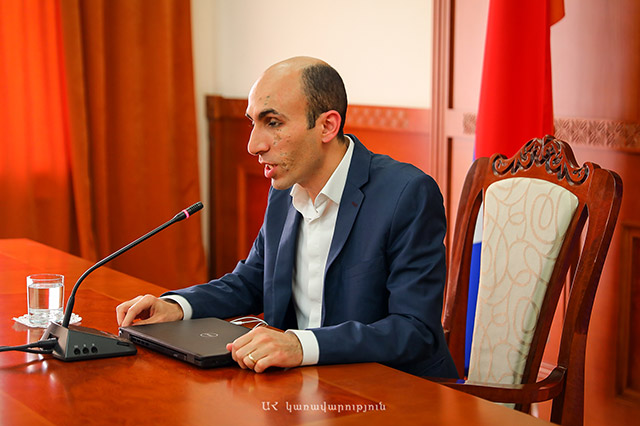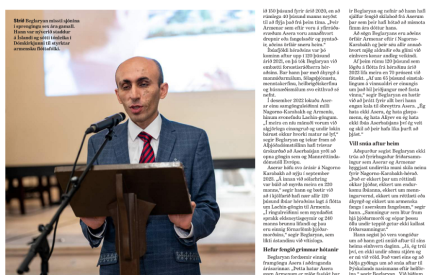Some points regarding #Armenia’s tendency to recognize the territorial integrity of Azerbaijan and the recent statement of the President of the European Council, Charles Michel, relating to Artsakh.
1. Any document and statement recognizing Artsakh as a part of Azerbaijan is highly unacceptable, as the authorities of the Republic of Artsakh, at the levels of the President, the National Assembly, the Security Council and the Ministry of Foreign Affairs, have stated in many different wordings. It is unacceptable, because:
1.1. The people of Artsakh exercised their inalienable right to self-determination with jus cogens (binding) norm in 1991 based on the fundamental documents of international law (UN Charter, UN International Covenants on Rights, Helsinki Final Act, etc.). In later years, the Artsakh people have defended their rights and proved their own will and ability of sovereignty.
1.2. Although the Republic of Artsakh has not been fully recognized by the international community, however, its independence has been accepted as a reality, and its status has been internationally recognized as a disputed and contested territory.
1.3. The main subject of any decision regarding the status and future of Artsakh is the people of Artsakh, the other big and small actors have the right only to express their positions, but not to decide on behalf of the people of Artsakh or to make Artsakh an object of trade.
Read also
1.4. Therefore, ignoring this past path and the rights and serious existential dangers of the indigenous and title-holder people of Artsakh is simply an international crime.
2. One of Azerbaijan’s regular pitfalls and false arguments is the thesis of by default continuity of the Soviet borders, on the basis of which the processes of mutual recognition of the territorial integrity of Armenia and Azerbaijan is taking place. It is baseless and false for several reasons, in particular:
2.1. The administrative territorial division of the USSR could not become a state border according to the logic of the international legal principle of uti possidetis juris (continuity of former internal borders), because that principle is not a universal principle and was applied with great reservations only with clear mutual agreement between some decolonizing states of South America and Africa. Kosovo is one of the good examples of the exclusion of that principle, because even in the case of the collapse of Yugoslavia, the primary principle in defining the borders of the former member states was the principle of “remedial secession”, inextricably based on the right of peoples to self-determination.
2.2. Even Azerbaijan at the highest level rejected the continuity of the Soviet borders, when the Supreme Council of that country in 1991 adopted declaration “On restoration of state independence of Azerbaijan” and the constitutional act “On restoration of state independence of Azerbaijan”. With those documents, Azerbaijan renounced the succession of Soviet Azerbaijan and declared itself the successor of the Azerbaijan Democratic Republic of 1918-1920. This fact is important to emphasize not only because Azerbaijan initially rejected the application of the principle of uti possidetis juris, but also, in the pre-Soviet period, Nagorno Karabakh was internationally considered by the League of Nations as a disputed territory and had much larger territory than the former NagornoKarabakh Autonomous Oblast (region), as well as had a common border with Armenia.
2.3. Even if Armenia and Azerbaijan mutually agree to use the internal administrative borders of the USSR for the purpose of delimitation and demarcation, it is worth to underline that this still does not mean the exclusion of the right to external self-determination of the people of Artsakh, at least in the former Nagorno-Karabakh Autonomous Oblast. It was an enclave in the last decades of the Soviet Union and had no direct association with the borders of the two former Soviet republics. Therefore, in extreme cases, this is also an opportunity for the Republic of Armenia to somehow combine the continuity of the Soviet borders with the recognition and protection of Artsakh’s right to external self-determination. However, the necessary condition for this solution is that Armenia should not in any way try to recognize Artsakh as part of Azerbaijan and should not close the opportunity and obligation to support Artsakh’s struggle for self-determination.
3. The actions and statements by the Republic of Armenia aimed at recognizing Artsakh as part of Azerbaijan are unacceptable and illegal, based on both the well-known international legal documents and the domestic legislation of the Republic of Armenia. In particular:
3.1. The Declaration of Independence of the Republic of Armenia clearly recognizes Artsakh as a part of the Republic of Armenia, “based on the joint decision of the Supreme Council of the Armenian SSR and the National Council of Nagorno Karabakh dated December 1, 1989, “On the reunification of the Armenian SSR and Nagorno Karabakh”. Although later the path of Artsakh independence was chosen, deviating from the given provision of the Armenian Declaration of Independence, but even under that condition, the legal possibility of Armenia to recognize Artsakh as part of Azerbaijan is unequivocally excluded. Therefore, being the cornerstone of the Armenia’s Constitution, the Declaration of Independence is a solid legal basis for recognizing any international treaty signed by Armenia as unconstitutional and void from the start, which may recognize Artsakh as part of Azerbaijan.
3.2. The Almaty Declaration of December 21, 1991, which references also the right to self-determination, is a derived declaration from the December 8 Agreement that led to the creation of the Commonwealth of Independent States (CIS).This agreement was ratified by the Armenia’s Supreme Council on February 18, 1992, with clear reservations regarding the Nagorno-Karabakh Republic, which:
• Article 5 was supplemented with the phrase “the right of free self-determination of nations”, ratifying in the following version: “The parties recognize and respect the right of nations to free self-determination, each other’s territorial integrity and the inviolability of borders.”
• Point 10 states: “After the words “open to all the member states of the USSR” in the second paragraph of Article 13 of the Agreement, add “including for the former autonomous entities of the USSR, which before the adoption of the declaration of the Supreme Council of the USSR “on the termination of the existence of the USSR” had a popular referendum on declaring independence, and based on it, the highest executive body of the autonomous entity applied to the Commonwealth of Independent States with a request to join the organization.”
3.3. On July 8, 1992, the Supreme Council of Armenia adopted a decision, the 2nd point of which stipulates: “It is unacceptable for the Republic of Armenia to consider any international or domestic document by which the Republic of Nagorno-Karabakh might be mentioned as part of Azerbaijan.”
3.4. In other words, the Republic of Armenia with its founding document, the Declaration of Independence, clearly and irrevocably excluded any possibility of recognizing Artsakh as part of Azerbaijan, and with the decisions of the Supreme Council, which have the force of law, established the right of free self-determination of nations and created a legal basis for the possibility of Artsakh’s membership in the CIS, as well as directly considered unacceptable any document indicating the status of Artsakh as a part of Azerbaijan.
So, Armenia can recognize the territorial integrity of Azerbaijan, but never with the inclusion of Artsakh or the territory of 86,600 km2. In that sense, Nikol Pashinyan’s statement today regarding the readiness to recognize the territorial integrity of Azerbaijan along with Artsakh is highly unacceptable and worrying.
4. As for the non-legal justifications, taking into account the exceptional importance of Artsakh in the security, international relations, identity and other fields of the Armenian statehood and the Armenian nation, it is even unnecessary for many to explain why any document and statement by Armenia recognizing Artsakh as a part of Azerbaijan is impermissible and unacceptable. I will cover the details of this direction in other publications.
P.S. And when referring to Michel’s timid and groundless urgings and expressions about the rights and security of the people of Artsakh, due to his use of Azerbaijani theses, I have to call him “the former elected representative of the population of the former Southern Netherlands”. And for the Republic of Armenia, the issues of rights and security of the people of Artsakh cannot bypass the right to self-determination, which in this case is the core of the rest of the rights and even security architecture of Artsakh and Armenia.
Artak Beglaryan, Advisor to the State Minister of the Republic of Artsakh
Some points regarding #Armenia's tendency to recognize the territorial integrity of #Azerbaijan and the recent statement of the President of the European Council, Charles Michel, relating to #Artsakh.
— Artak Beglaryan | #StopArtsakhBlockade (@Artak_Beglaryan) May 22, 2023
1. Any document and statement recognizing Artsakh as a part of Azerbaijan is…


























































